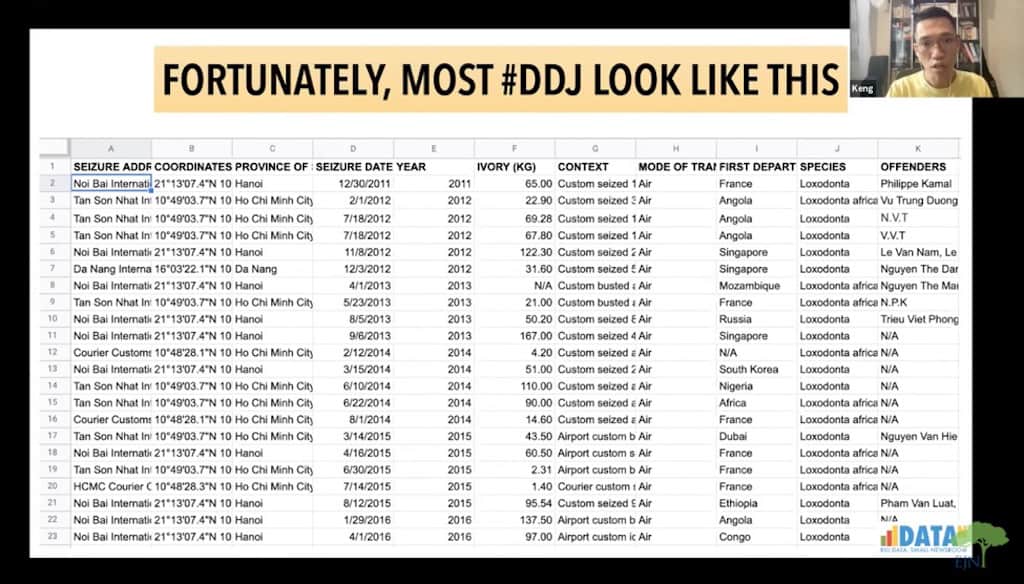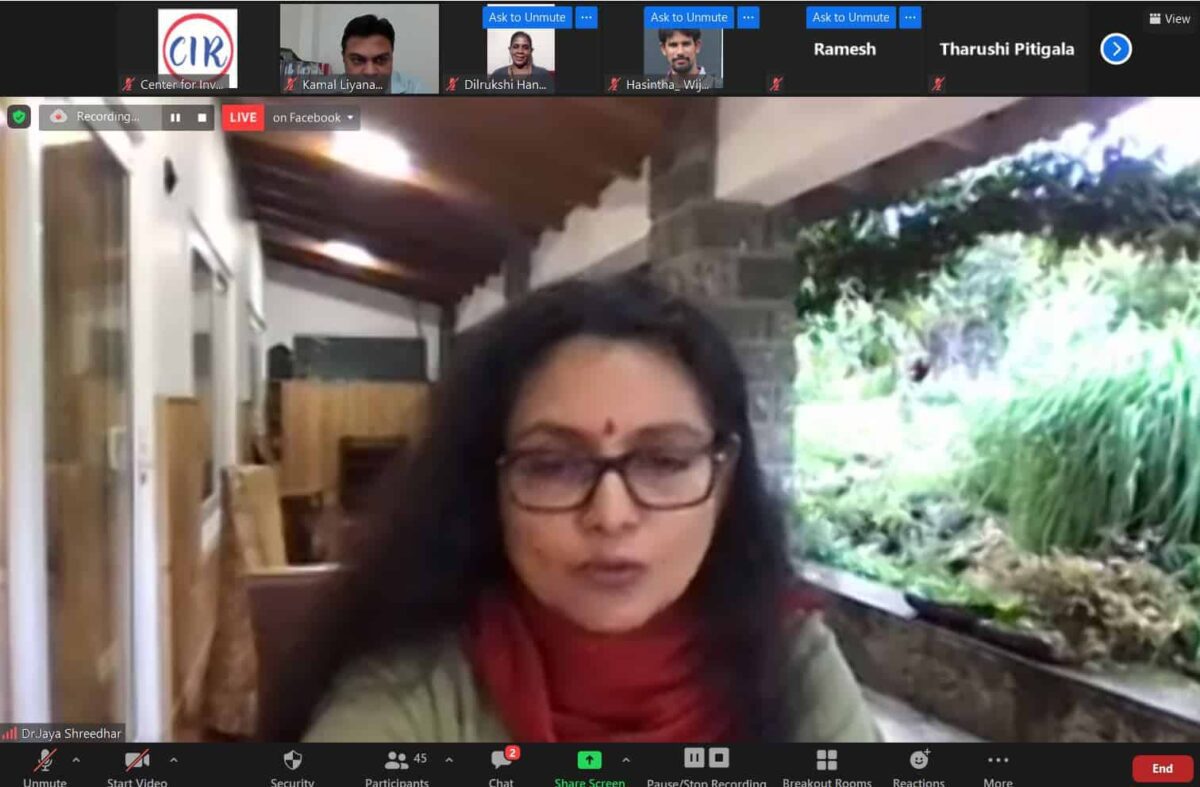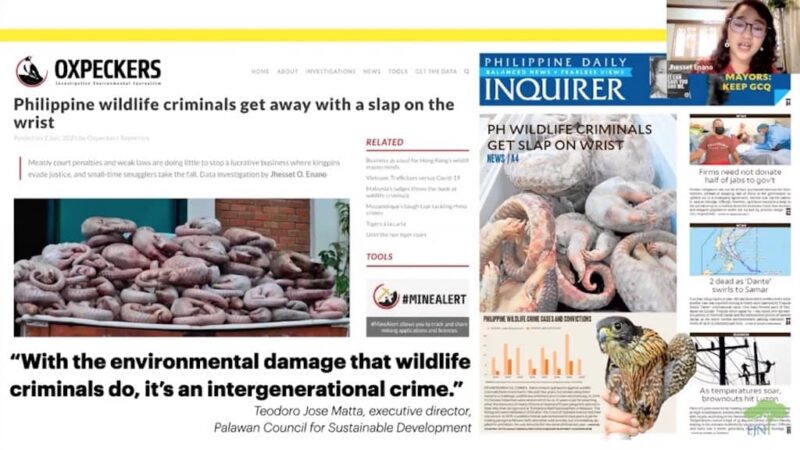For this year’s World Environment Day on June 5th, EJN’s Asia-Pacific Project supported a wide range of activities across the region, building journalists’ capacity and sparking discussion around key environmental topics like wildlife trafficking, data journalism, sand mining, illegal fishing and the need to focus on youth and Indigenous communities.
#WildEye journalists talk: Investigating wildlife crime in Asia
In partnership with Oxpeckers Investigative Environmental Journalism, EJN hosted a learning event on June 3rd for reporters across Asia to hear from WildEye grantees about their experiences and lessons learned.
Investigative journalism grantees Vo Kieu Bao Uyen, Jhesset Enano and Sadiq Naqvi spoke extensively about their respective projects, including their successes and challenges. Enano discussed her recent project on the Philippines’ lenient sentencing for wildlife criminals, including her initial troubles with using data storytelling and having to wade through dense government documentation.
Overall, accessing data was one common theme through the presentations. Even when Enano managed to acquire the necessary information, there were plenty of holes. Uyen, in Vietnam, couldn’t get help from the government and ended up creating her own dataset to cover how the country’s justice system was allowing wildlife traffickers to go free with little punishment.

Later, data journalists Keng Kuang, Richa Syal and Rezza Aji Pratama discussed their experiences with data, as well. Kuang, the founder of DataN, emphasized that data journalism does not need to be elite: While some investigations come from large newsrooms with many resources, there are also smaller teams producing good work, as well.
You can watch the full recording of the webinar on our website and read a recap written by the Oxpeckers team there as well.
Green-tagged: Defending environmental defenders and storytellers
In the Philippines, independent media outlet FYT held an online forum on June 4th to highlight the risks that environmental advocates, journalists and other storytellers face when doing their work. The panel was moderated by Kara David, an award-winning broadcast journalist and the founder of Project Malasakit. She was joined by panelists Imelda Abano, EJN’s Philippines and Pacific Content Coordinator, UNEP Champion Joan Carling, Leon Dulce of the Kalikasan People’s Network for the Environment, Palawan News editor-in-chief Redempto Anda, human rights advocate and attorney Tony La Vina and FYT Media’s founder, Voltaire Tupaz.
Four additional speakers were invited to provide their personal experiences, including broadcast journalist Atom Araullo, former EJN media fellow Kristine Sabillo, Center for Environmental Concerns Executive Director Lia Mai Torres and environmental journalist Gaea Cabico.
Carling, who is an Indigenous Filipina human rights activist and served as Secretary General of the Asia Indigenous Peoples Pact, gave a presentation on trends in environmental protection and Indigenous activism, both in the Philippines and globally.
Later in the event, Tony La Vina shared tips for how to protect your rights as journalists and storytellers when facing security risks. He noted that focusing on the science, understanding the stakeholder relationships, identifying key allies and knowing your rights are some of the most important things to keep in mind.
You can watch the full recording of the event on FYT’s YouTube page.
Youth power in tackling urgent environmental issues
The Association of Young Environmental Journalists (AYEJ) held another EJN-supported event in the Philippines on June 5, focusing on under-reported environmental issues and the power of young journalists and storytellers to cover them.
The event was moderated by Val Amiel Vestil, AYEJ’s co-founder and executive director. Panelists included Dennis Rosales of the Forest Foundation Philippines, the World Bank Group’s Angelo Tan, Kimberly Casipe from the Philippine Reef & Rainforest Conservation Foundation, broadcast journalist Atom Araullo, Mongabay Environews Philippines’ Leilani Chavez and AYEJ’s Erica Joy Ungria.
The panel began with a round robin discussion where several panelists focused on key environmental issues in the region, including fisheries, marine protected areas, participatory science, biodiversity and more.
Later in the webinar, Vestil led the participants in a game break, called “Name that Ecosystem!” The game included quiz questions about animal habitats, nature-derived medicine and ecosystem characteristics.
After the game break, the panelists continued their discussions, now more focused on journalism and storytelling around environmental issues. Chavez, from Mongabay Environews Philippines, spoke about the progress of the media in covering these issues, including the topics championed by environmental defenders.
You can watch the full event on AYEJ’s Facebook page.
Impacts of sand and boulder export from Nepal to India
Nepal’s digital broadcast initiative Equal Access hosted a countrywide radio program for World Environment Day on June 5th. More than 50 local radio stations across the country simultaneously broadcasted an hour-long radio talk show, designed to raise awareness about the impacts of sand and boulder export from Nepal to India.
This controversial plan to extract sand and boulders from the foothills of Nepal’s Himalayas, also known as the Siwaliks or Churia, was announced recently by the government of Nepal. Environmental activists have widely criticized the plan, which would affect the fragile Himalayan ecosystem and potentially increase erosion and flooding events, threatening local residents.
Rameshwor Khanal, the former Secretary of Finance and current Chairperson of the Churia Conservation Committee, was interviewed on the show about the potential impacts of the plan. He was also joined by the former president of Nepal, Dr. Rambaran Yadav.
The issue is continuing to gain awareness in the country: EJN’s South Asia Content Coordinator Ramesh Bhushal, who is based in Nepal and helped to organize the radio program, was invited to speak to a select group of lawmakers in Nepal’s National Assembly, where he led a discussion about the sand and boulder plan’s relationship to environmental degradation in the region.
Read more about Equal Access, which is funded by EJN’s Asia-Pacific Project.
How an island nation handles both Covid-19 and environmental threats
Vulnerable health care systems, medical waste and the environmental hazards faced by island nations were just a few of the key topics addressed at the very first Green Dialogue event hosted by the Center for Investigative Reporting in Sri Lanka, an EJN media grantee. Although not directly meant for World Environment Day, the event highlighted many similar issues.
The panel, which took place on June 16th, focused on Covid-19’s impacts on the Sri Lankan environment and was moderated by award-winning health journalist and medical doctor Dr. Jaya Shreedhar, who currently works as an Asia Health Media Advisor for Internews.

The expert panel consisted of Dr. Inoka Suraweera, a consultant community physician at the Ministry of Health; Dr. Rangika Bandara, a senior lecturer in the Department of Zoology and Environmental Management at the University of Kelaniya and Dr. Hasintha Wijesekara, a senior lecturer in environmental science in the Department of Natural Resources at the Sabaragamuwa University of Sri Lanka.
The three panelists shed insight into how Sri Lanka’s status as an island nation increases the potential environmental hazards produced by a global pandemic – specifically, because of medical waste, increased single-use plastics and the pollution created when the waste enters the ocean.
Both speakers pointed out the importance of plastic waste management and wastewater treatments, offering potential solutions. The third speaker, Dr. Bandara, introduced an eco-friendly plastic ‘helmet,’ designed by Dr. Bandara and her team, to replace the heavy usage of disposable PPE commonly used by healthcare workers. The helmet is made from recycled plastics and would protect users from Covid-19 infection.
Overall, more than 66 people joined the event through Zoom and Facebook Live. Green Dialogues on other critical environmental topics will be held in the future. Stay tuned to the Center for Investigative Reporting’s Facebook page for more details.
